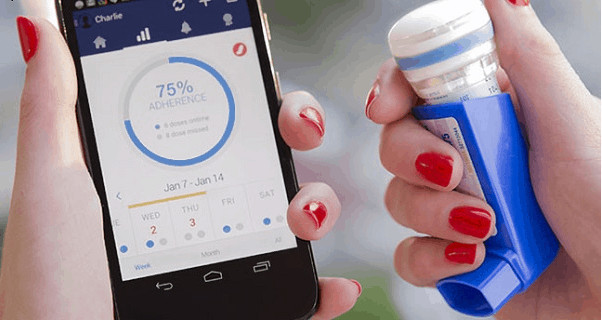1 in 12 Americans have Asthma, a disease responsible for 10.5 million physician visits a year. While some of these patients carry rescue inhalers – used as necessary during asthma attacks – many use maintenance inhalers, which are prescribed on a regular schedule to prevent attacks.
As with many prescription medications patients can forget or not adhere to their prescription, often causing preventable hospital visits. According to the CDC, non-adherence to inhaler prescriptions can cost patients anywhere from $700 to $4,000 annually in preventable medical costs.
One mHealth response to these challenges is smart inhalers – devices that sync with a mobile app and do anything from monitor adherence to notify patients of potential risks based on local weather and air quality. As MIT News reports, Gecko Health’s CareTRx launched in 2014 with the goal of “transforming respiratory disease management” using a smart device that fits on metered-dose inhalers. Now owned by Teva Pharmaceuticals, CareTRx automatically tracks use and schedules dose reminders, while recording and displaying usage information on mobile devices or sending data to physicians.
A similar concept has been developed through Adherium’s Smartinhaler, which records when medication was taken and sends data to mobile devices and computers via Bluetooth. The device was developed specifically to help patients and caregivers remotely monitor patient adherence to their medication. According to data released last year, the Adherium Smartinhaler improved patient adherence by 144 percent while increasing lung function and decreasing use of oral steroids.
In addition to improving care through adherence, the Smartinhaler is being used in research to determine the most effective asthma treatment regimens. As MobiHealthNews reports, the Medical Research Institute of New Zealand recently announced a multi-country clinical study using Adherium’s inhaler to investigate the safety and efficacy of three different treatment regimens for mild asthma. The study tests two drugs: inhaled corticosteroid (ICS) – an anti-inflammatory agent that acts locally in the lungs and is the preferred treatment for long-term control of asthma symptoms – and long acting beta agonist (LABA) – a longer-acting drug often prescribed alongside inhaled steroids that also increases risk of severe respiratory symptoms. The study will test combinations of the two drugs by monitoring 675 adults in New Zealand, Australia, the UK, and Italy.
As with many mHealth innovations, it’s easy to see how smart inhalers will improve research and generate data that could be very valuable when aggregated. But there’s also reason to believe that smart inhalers could improve life for asthma patients through better adherence and accurate research that determines the best medication regimens.
Smart inhalers also offer the more subtle benefit of engaging patients in their own health care. This might come from knowing your physician is tracking your doses, but it could also result from some interactive features of the gadgets themselves. For example, the CareTRx lights up when it’s time for a dose and the corresponding Journal App includes motivational badges for achieving goals. While these functions might seem trivial, they could work – especially for the 6.3 million children currently living with asthma in the U.S.
